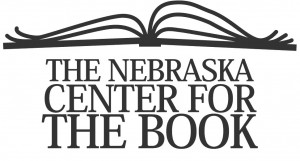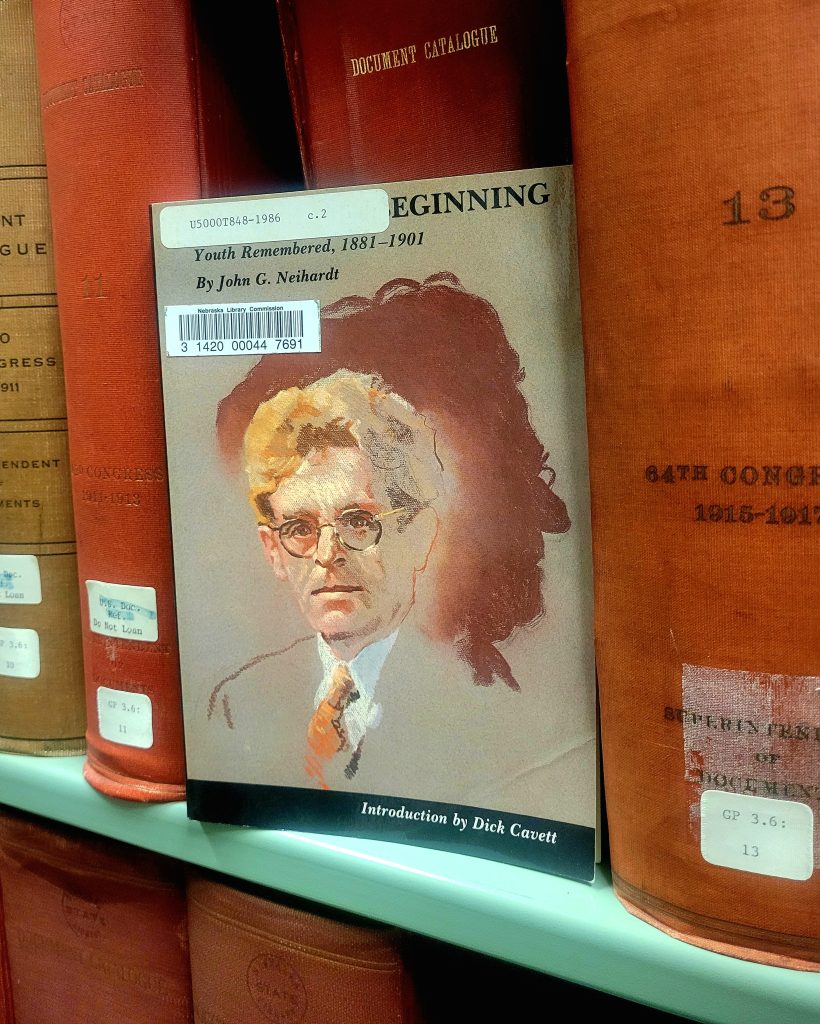Search the Blog
Categories
- Books & Reading
- Broadband Buzz
- Census
- Education & Training
- General
- Grants
- Information Resources
- Library Management
- Nebraska Center for the Book
- Nebraska Memories
- Now hiring @ your library
- Preservation
- Pretty Sweet Tech
- Programming
- Public Library Boards of Trustees
- Public Relations
- Talking Book & Braille Service (TBBS)
- Technology
- Uncategorized
- What's Up Doc / Govdocs
- Youth Services
Archives
Subscribe
Tag Archives: John G. Neihardt
Book Club Spotlight – The Twilight of the Sioux
Born in Sharpsburg, Illinois, in 1881, acclaimed “Prairie Poet of America” and UNL professor John G. Neihardt spent his early adulthood in Bancroft, Nebraska, near the Omaha Reservation. During that time, he became interested in the Westward Expansion and the subsequent displacement of Indigenous people during the American Indian/ Frontier Wars. As a lyrical poet, Neihardt spent 30 years composing a two-volume series of epic poems (songs), known as The Cycle of the West. Volume 1, The Mountain Men, focuses on the first non-native people to explore the West. While Volume 2, The Twilight of the Sioux, depicts the colonization of the American West from 1822 to 1890, through its poems, “The Song of the Indian Wars” and “The Song of the Messiah”, ending at the Wounded Knee Massacre.
Neihardt’s Black Elk Speaks, is considered controversial and inflated by some Lakota people and scholars. Similarly, some language, and beliefs in The Twilight of the Sioux, may be outdated, but Neihardt’s intentions remain in his lyrics.
The Song of the Indian Wars
Following the last push of the Plains tribes to drive out colonizers from the land between the Missouri and the Pacific, this is a tale of battle and warriors. We follow Chief Red Cloud as the Bozeman War makes its way through the Great Plains. Written less than a century after the events, Neihardt pulls from primary sources, interviewing and taking the perspective of veterans, both white and Native American into his sprawling account.
The Song of the Messiah
In the second song, we find the Plains tribes in low morale and destitution until there was a revival of hope brought about by the guidance of a spiritual leader and Paiute prophet Wovoka. Following his instructions in “The Messiah Letter”, the Ghost Dance Movement of 1890 combined old and new teachings to call upon the spirit world to restore peace and the earth to its uncolonized state. The movement grew as thousands danced unceasingly until the American army, scared of their power, burst into deadly action. Written only 35 years after the massacre, Neihardt invokes Christian iconography throughout this song, describing the massacre as the “crucifixion of a people”, with Wovoka as the messiah figure, and Wounded Knee as a new Golgotha.
“How can I know that I know anything?
John G. NEihardt
The coming of the grasses in the spring-
Is it not strange so wonderful a tale
Is really true? Did mornings ever fail,
Or sleeping Earth forget the time to grow?
How do the generations come and go?
They are, and are not. I am half afraid
To think of what strange wonders all is made!
And shall I doubt another if I see?”
Twilight of the Sioux is a masterpiece in poetry and prose. But it’s also an important history lesson in the latter half of Native American Heritage Month. It’s fascinating to read an artistic account of the American Frontier Wars, penned by a contemporary only a few dozen years later. Wanting to write on the human condition, especially the social and emotional change of coming into adulthood, Neihardt found that America was also in a world of change and growth, describing it as a “strange new world that is being born in agony”. Though there are no specific discussion questions regarding this title for Book Club Groups, Twilight of the Sioux is considered an educational staple, filled with opportunities to learn and discuss the history of Westward Expansion and Neihardt’s particular writing style.
Even though this tale ended in bloodshed, Neihardt knew the story wasn’t over, believing that “All spiritual truths triumph in this world through apparent defeat” (x). He had faith in the continued spirit of the Native American people and their perseverance after the end of the American Frontier Wars. Today, the Nebraska Library Commission sits on the ancestral land of the Pawnee and Otoe-Missouria, and despite the systemic and brutal erasure of their lives and homeland, Native Americans were and still are stewards of this land; with Indigenous lead movements today like The Water Protector Legal Collective, NDN Collective, and a continued push for sovereignty.
Related Listening:
- Introduction to A Cycle of the West – an interview with John Neihardt
- Wovoka – Redbone
- We Were All Wounded At Wounded Knee – Redbone
If you’re interested in requesting Twilight of the Sioux or your book club, you can find the Request Form here. There are 9 copies. (A librarian must request items)
Neihardt, John G. Twilight of the Sioux. Macmillan Company. 1948
Posted in Books & Reading
Tagged book club spotlight, books, John G. Neihardt, Nebraska History, Reading
Leave a comment
Governor Ricketts Proclaims 2017 One Book One Nebraska: Black Elk Speaks

 FOR IMMEDIATE RELEASE:
FOR IMMEDIATE RELEASE:
January 11, 2017
FOR MORE INFORMATION:
Rod Wagner
402-471-4001
800-307-2665
Governor Ricketts Proclaims 2017 One Book One Nebraska: Black Elk Speaks
On Jan. 9, 2017 Governor Pete Ricketts signed a proclamation honoring 2017 One Book One Nebraska: Black Elk Speaks by John G. Neihardt. In this year people across Nebraska are encouraged to read this novel. The story of the Oglala Lakota visionary and healer Nicholas Black Elk (1863-1950) and his people, offers readers much more than a glimpse of a vanished time. Black Elk’s searing visions of the unity of Humanity and Earth, conveyed by John G. Neihardt, have made this book a classic that crosses multiple genres and generations. The 2017 One Book One Nebraska selection is among 150 books chosen to highlight the 150th year celebration of Nebraska’s statehood. Rod Wagner, Director of the Nebraska Library Commission, presented the governor with a copy of the book. “The John G. Neihardt Foundation and State Historic Site in Bancroft is honored to take part in sharing this story, as well as our heritage and history, together with Nebraskan readers and beyond,” said Amy Kucera, Executive Director at the John G. Neihardt State Historic Site. “This transcendent tale is a true gift – created from a remarkable past so we might better understand the present, it continues to inform and inspire the future as each generation takes its turn through the pages.”
Photos of the proclamation-signing ceremony are available online.
The One Book One Nebraska reading program is entering its thirteenth year and is sponsored by the Nebraska Center for the Book, Nebraska Library Commission, John G. Neihardt Foundation & Nebraska State Historical Society, University of Nebraska Press, Humanities Nebraska, and Nebraska libraries and regional library systems. It encourages Nebraskans across the state to read and discuss one book, chosen from books written by Nebraska authors or that have a Nebraska theme or setting. Libraries across Nebraska will join other literary and cultural organizations in planning book discussions, activities, and events to encourage Nebraskans to read and discuss this book. Support materials to assist with local reading/discussion activities are available on the 2017 One Book One Nebraska web page. Updates and activity listings will be posted there and on the NCB Facebook page.
The Nebraska Center for the Book is housed at the Nebraska Library Commission and brings together the state’s readers, writers, booksellers, librarians, publishers, printers, educators, and scholars to build the community of the book, supporting programs to celebrate and stimulate public interest in books, reading, and the written word. The Nebraska Center for the Book is supported by the Nebraska Library Commission.
As Nebraska’s state library agency, the Nebraska Library Commission is an advocate for the library and information needs of all Nebraskans. The mission of the Library Commission is statewide promotion, development, and coordination of library and information services-“bringing together people and information.”
###
The most up-to-date news releases from the Nebraska Library Commission are always available on the Library Commission Website, http://nlc.nebraska.gov/publications/newsreleases.



